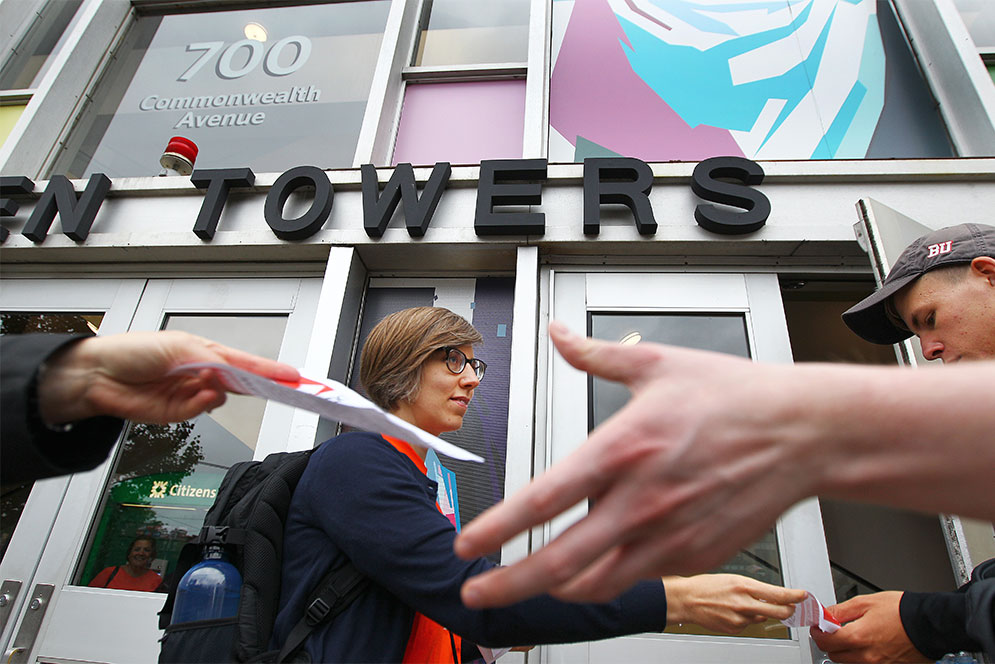BU, Lecturers Agree on First-Ever Contract
Three-year deal includes 2.5 percent raises, professional development funding

Jessica Kent, a Writing Program lecturer, hands out flyers during Move-in weekend. Photo by Pat Greenhouse/The Boston Globe via Getty Images
- BU salaried lecturers ratify first-ever union contact
- Deal includes 2.5 percent annual increases
- Opportunities to earn more based on teaching performance
BU’s salaried lecturers and instructors in several Charles River Campus schools on Friday ratified their first contract with the University since unionizing last year. The three-year agreement includes a 2.5 percent salary adjustment each year, starting in 2018, for about 240 lecturers and instructors who are members of the Service Employees International Union (SEIU) Local 509.
BU also will enhance its current funding for lecturers’ professional development, and starting next September, for recognizing lecturers with distinguished service.
Both sides hailed the contract, which averted a possible strike.
“This is a really solid contract,” preserving “robust academic and management rights for the University and recognizing teaching excellence and meritorious performance,” says Judi Burgess, the University’s labor relations director.
The SEIU agreed during negotiations that the union and Jean Morrison, University provost, must mutually agree to any outside review of decisions not to reappoint long-term lecturers and instructors, a concession “that helped to finalize the new agreement,” Burgess says. “Ultimate academic decision-making and determinations are, appropriately, left to the provost or her designee.”
Morrison says the lecturers “are skilled and dedicated faculty. The contract we have negotiated brings clarity and predictability to critical areas like compensation, appointment length, and promotion, and provides a formal mechanism for the University to invest in their professional development.”
These changes, she says, will benefit lecturers “and their students, and keep BU on competitive footing for the finest lecturers in the Boston area.”
“The salary increases in the agreement are of vital importance to the union’s members,” says William Marx, a College of Arts & Sciences Writing Program senior lecturer. “A full-time lectureship at BU should offer a living wage in a city as expensive to live in as Boston.
“There were also important gains made regarding transparency, professional development, and job security,” Marx says. “This is the first step in making the concerns of the full-time lecturers heard, a process that will inevitably improve the quality of education at BU.”
In an SEIU statement, Seaghan McKay, a College of Fine Arts lecturer in lighting and media production, says that “by coming together as a union, we have built a better understanding of our colleagues’ working conditions across departments and disciplines. This contract is a clear way to make sure all of us are compensated and treated fairly.”
Excluded from the bargaining unit are all professors (full, associate, assistant, and professors of the practice); faculty compensated solely on a per-course basis; all faculty at the School of Medicine, the Goldman School of Dental Medicine, the School of Public Health, the School of Law, the Questrom School of Business, Sargent College, and the College of Engineering; and deans, provosts, administrators, department chairs and associate chairs, members of the University Council, and a host of other employees, students, and faculty who teach exclusively in online programs.
The SEIU says more than 3,500 faculty members at various Boston universities have joined it in recent years, including full-time teaching staff at Tufts and Lesley.
Comments & Discussion
Boston University moderates comments to facilitate an informed, substantive, civil conversation. Abusive, profane, self-promotional, misleading, incoherent or off-topic comments will be rejected. Moderators are staffed during regular business hours (EST) and can only accept comments written in English. Statistics or facts must include a citation or a link to the citation.